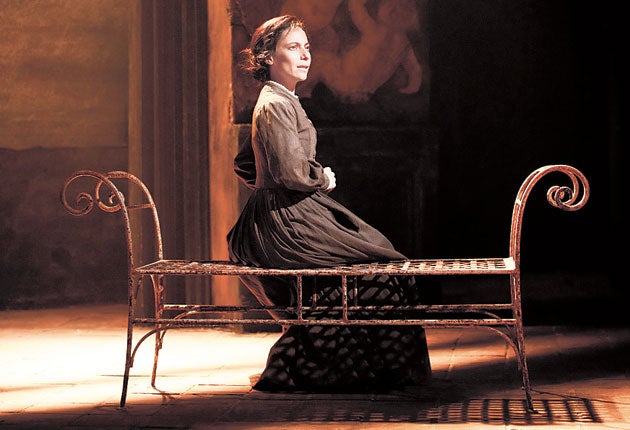David Lister: They're still acting even when they break into song
The Week in Arts

Whenever apocalyptic articles are printed about the state of West End theatre, it is pointed out how many musicals are on: the higher the proportion of musicals to straight plays, the nearer the end of the world.
I've never quite gone along with this. I feel about musicals the way my colleague and Booker Prize winner Howard Jacobson does about comic novels. The same snobbery that kept comic novels away from the top prizes until Howard's recent success also keeps musicals as the second-class citizens of theatre.
When the National Theatre at the turn of the millennium looked at the 100 best plays of the past century, not one musical figured in the list, a decision which had Mr Musicals himself, Sir Cameron Mackintosh, describing the National to me in language unbecoming of an impresario.
And not a lot has changed since then. The estimable Nicholas Hytner, when he took over at the National Theatre, promised he would have fewer musicals and has kept that promise, having only three so far, though this week's new musical production Fela received rave reviews.
Fewer musicals seem to be taken as a badge of honour, though quite why the British musical is not an integral part of our national theatrical heritage I'm unsure. Ironically, one of the most moving, funny and dramatic musicals of the past 20 years, Miss Saigon, was directed, brilliantly, by Nicholas Hytner.
And that's what musicals can be – funny, moving, poignant and, yes, vehicles for fine acting, just like straight plays. Yet generally they are seen as a thing apart. The Olivier awards for theatre make separate acting categories for performances in musicals. They are not to be considered alongside "legitimate" theatre.
So I'm pleased to hear on the grapevine that next week's Evening Standard Theatre Awards, which do not differentiate between musicals and straight plays in acting awards, will for the first time have two actresses from musicals on the best actress shortlist of four. I hear that Sheridan Smith for Legally Blonde and Elena Roger for her performance in Passion are likely to be on the list, seeing off classical actresses such as Judi Dench, Helen McCrory, Lesley Manville, Fiona Shaw and Zoë Wanamaker.
Is this the end of civilisation as we know it? No, it's the beginning of a shift in the theatre to see that a dazzlingly funny turn like Sheridan Smith's in Legally Blonde is as just as fine a piece of comic acting as a performance in an Ayckbourn play or a Molière adaptation. The fact that she breaks into song from time to time doesn't limit the performance; it adds another dimension to it.
Perhaps the fact that musicals are often – though certainly not always – feel-good events and attract the coach parties has been behind the whiff of snobbery. There's no such distinction between theatre and opera, with both art forms being seen as serious enterprises for serious people. Strange. From where I sit, it's all theatre.
Who wants to be in the Cambridge club?
Among the tributes paid to Sir Peter Hall in this paper yesterday to mark his forthcoming 80th birthday, Ian McKellen's stood out for me. Sir Ian remarked, seemingly apropos of nothing, that Sir Peter's three successors at the helm of the National Theatre were all "Cambridge graduates with a degree in English". (In fact, Sir Peter was one such as well.) Sir Ian seems to have a bit of a thing about this. When I last chatted to him a few years ago when Trevor Nunn was departing the National Theatre, a worried Sir Ian told me that he hoped Nunn's successor wouldn't be yet another Cambridge graduate with a degree in English. It turned out to be. Nicholas Hytner, a Cambridge graduate with a degree in English.
It's a curious obsession for Sir Ian McKellen to have, not least because one other prominent person in the arts who is a Cambridge graduate with a degree in English is Sir Ian McKellen. I wonder what caused this phobia. Perhaps he suffered a particularly traumatic seminar in his student days.
Help! Too many Beatles clichés
Nice to see that the Beatles and Apple have ended their long-running feud, allowing Beatles' songs and albums to be put on iTunes. But it was a little cringe-worthy to see the laboured song title references in virtually every quote that accompanied the news. It came as no great surprise that Yoko Ono was glad everyone had decided to "give peace a chance". But did Apple CEO Steve Jobs really need to rifle through his record collection to conclude that "it has been a long and winding road to get here". I enjoyed rather more Ringo summing up with the phrase "peace and love". It's quite sweet that he hasn't realised he's the only person on the planet who still uses the phrase.
No word from any of the protagonists as to how the deal was finally agreed. But none of the people quoted this week referenced the group's old lyric "I don't care too much for money".
Join our commenting forum
Join thought-provoking conversations, follow other Independent readers and see their replies
Comments
Bookmark popover
Removed from bookmarks